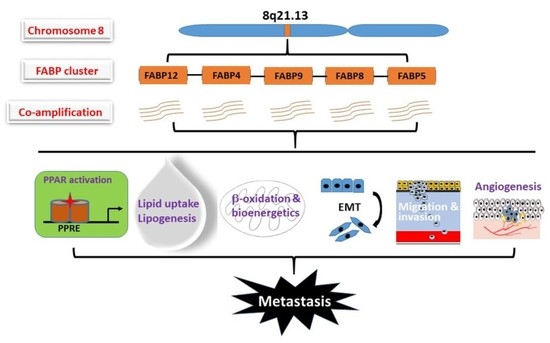Cancers, Vol. 12, Pages 3823: An Amplified Fatty Acid-Binding Protein Gene Cluster in Prostate Cancer: Emerging Roles in Lipid Metabolism and Metastasis
Cancers doi: 10.3390/cancers12123823
Authors: Rong-Zong Liu Roseline Godbout
Treatment for early stage and localized prostate cancer (PCa) is highly effective. Patient survival, however, drops dramatically upon metastasis due to drug resistance and cancer recurrence. The molecular mechanisms underlying PCa metastasis are complex and remain unclear. It is therefore crucial to decipher the key genetic alterations and relevant molecular pathways driving PCa metastatic progression so that predictive biomarkers and precise therapeutic targets can be developed. Through PCa cohort analysis, we found that a fatty acid-binding protein (FABP) gene cluster (containing five FABP family members) is preferentially amplified and overexpressed in metastatic PCa. All five FABP genes reside on chromosome 8 at 8q21.13, a chromosomal region frequently amplified in PCa. There is emerging evidence that these FABPs promote metastasis through distinct biological actions and molecular pathways. In this review, we discuss how these FABPs may serve as drivers/promoters for PCa meta static transformation using patient cohort analysis combined with a review of the literature.



No comments:
Post a Comment